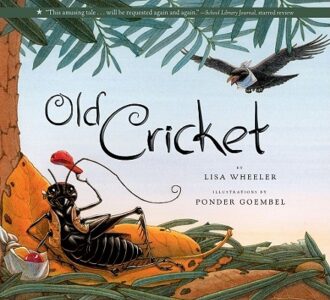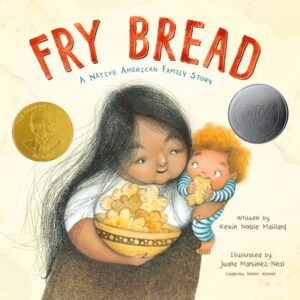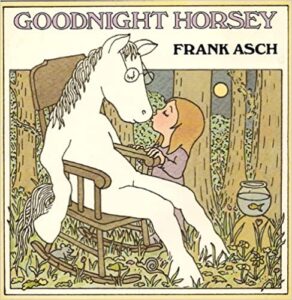Last month I presented 5 techniques that were easily learned from reading picture books (Part 1) regardless of what format or genre you work in. The fact that picture books are so short means you can find numerous examples of literary techniques in the best of them. And they are great teaching tools because they require precision and elegance.
Today we will cover 5 more techniques you can find in picture books. There are many titles I could have chosen to list below. These books happen to be titles I love. If you cannot find them in a bookstore, many may be found in a library. Also, some of the titles below can be used to demonstrate more than one technique. Hopefully, you will see how a good, small-sized collection of picture books might be used to expand your (or your students’) understanding of literary techniques.
Personification
Giving human qualities to inanimate objects, abstractions, movements, events, etc. Often, in picture books, you’ll find animals as stand-ins for humans.
Examples: In everyday speech: “justice demands” or “instinct tells us.” In Click, Clack, Moo: Cows that Type the cows find a typewriter and use it to make demands of Farmer Brown. When their demands aren’t met, they go on strike. In School’s First Day of School the actual school building is personified and he’s embarrassed when his fire alarm sounds.
- Doreen Cronin, Click, Clack, Moo: Cows that Type
- Adam Rex, School’s First Day of School
- Bill Martin, Chicka Chicka Boom Boom
 Onomatopoeia
Onomatopoeia
Words that bring to mind the sound of their meanings.
Examples: splat, sizzle, buzz and puff. The classic book The Little Engine That Could by Watty Piper starts out “Chug, chug, chug. Puff, puff, puff. Ding-dong, ding-dong.”
- Bill Martin, Chicka Chicka Boom Boom
- Lisa Wheeler, Old Cricket
- Karma Wilson, Bear Snores On
Hyperbole and Understatement
Hyperbole: overstatement, such as in tall tales, or American slang. Understatement: not saying it all, a withholding of images that can draw the reader closer to the work. Related technique: Irony. (See the Jan. 6, 2023, post: Part 1.) This is especially effective in picture books that create irony through the interaction of an understated text and hyperbolic illustrations, or vice versa.
Examples: “Any snake dumb enough to bite him instantly got convulsions and died.” (Steig. Hyperbole.) “I didn’t ask/what kinds of things/hide behind black trees/in the middle of the night.” (Yolen. Understatement.) Note: Langston Hughes’ poem “My Friend” is a fine example of understatement.
- Ezra Jack Keats, The Snowy Day (Understatement)
- David McPhail, Pigs Aplenty, Pigs Galore! (Hyperbole)
- William Steig, Shrek! (Hyperbole)
- Jane Yolen, Owl Moon (Understatement)
 Metaphor and Simile
Metaphor and Simile

Figures of speech that compare one thing to another and expand our understanding. Metaphor is stronger. It gives the characteristics of one thing to another: Similes use a connecting comparative word such as “like” or “as,” so there is some distance from the immediacy of the image. Related techniques: Analogy: Extended reasoning based on metaphor. Synesthesia: using one sense to portray another: “bitter smile.” Note: because picture books rely so heavily upon illustration, often the characters are actually drawn as the metaphor. (See Asch below, in which Dad is pictured as a horse.)
Examples: “The mouth of a river” or “table legs” are metaphors. “As strong as an ox” or “raging like a wild boar” are similes.
- Frank Asch, Goodnight Horsey
- Joanna Ho, Eyes That Kiss in the Corners
- Kevin Noble Maillard, Fry Bread: A Native American Family Story
Suspense/Foreshadowing
Language that expressly, or indirectly through the use of cultural conventions, sets the reader up for certain expectations.
Examples: Read the first page of Pigs Aplenty, Pigs Galore! by McPhail and compare it to the opening of Poe’s “The Raven.” (indirect)
- David McPhail, Pigs Aplenty, Pigs Galore!
- Margie Palatini, Piggie Pie
- Allen Say. Grandfather’s Journey
- Jon Scieszka. The True Story of the 3 Little Pigs

Jeff Sandoz
Hello Shutta,
Do you edit poems? I have a Christmas poem that needs to be tweaked! Thanks!!!
Jeff
Shutta Crum
Hi, Jeff–
I’m in a number of poetry critique groups and do a lot of critiquing. However, I generally write contemporary free verse with no rhyme or meter. So, I’m not sure how helpful I’d be with a Christmas poem. Do you have a writing group you belong to that could help? Shutta